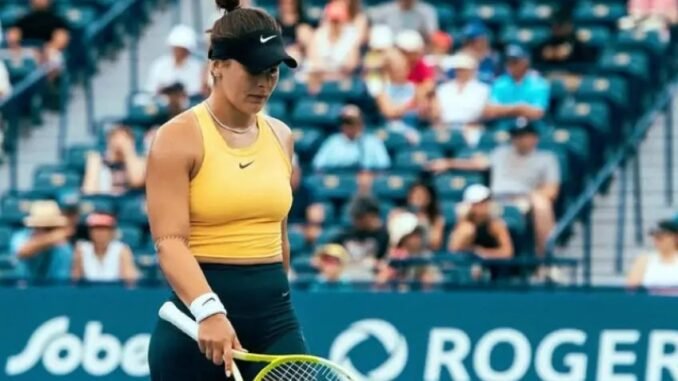
Bianca Andreescu Explains How the Tour Disregarded Her Following Her Success Amidst Deepening Controversies Due to Injuries and Career Setbacks
Former US Open champion Bianca Andreescu has opened up in a candid and emotional interview, explaining how she felt disregarded and overlooked by the tennis world following her meteoric rise to stardom — and the brutal career struggles that followed. In a deeply personal conversation, Andreescu revealed that injuries, mental health battles, and a sense of abandonment by the tennis establishment created a perfect storm that stalled one of the most promising careers in recent memory.
Her reflections come as Andreescu continues her slow comeback, aiming to regain the form that once saw her topple Serena Williams in the 2019 US Open final and skyrocket into global fame. Yet behind the celebrations of that historic victory, a darker story was quietly unfolding — one that highlights the relentless, and often unforgiving, nature of professional sports.
“I Was Treated Like a Sensation — Then Forgotten”
In her revealing interview, Andreescu did not hold back about her experience after winning her first Grand Slam at just 19 years old.
“After the US Open, it felt like I was everyone’s favorite for a few months,” she said. “But as soon as I got injured, it was like the tour — the system — forgot about me. The support disappeared. I went from being a future No.1 to being a question mark overnight.”
Andreescu’s career was severely impacted by a knee injury that sidelined her for much of the 2020 season, followed by further setbacks related to her foot, back, and mental well-being. While fans and media once hailed her as a game-changer with her unique blend of power, finesse, and strategic intelligence, the same voices soon turned skeptical, labeling her as “injury-prone” and “unreliable.”
“It felt like I wasn’t given the grace or patience that some others got,” Andreescu added, subtly hinting at the double standards that can exist for young female players versus their male counterparts.
The Role of Mental Health: A Silent Battle
Adding another layer to her struggles was a silent battle with mental health that Andreescu now speaks about openly.
“People see the wins and the trophies, but they don’t see the toll it takes mentally,” she said.
“Dealing with injuries alone is hard enough. But dealing with the anxiety of losing your place, of feeling forgotten, it’s even harder.”
Andreescu took a break from the tour in 2021 to focus on her mental health, joining a growing group of athletes — including Naomi Osaka and Simone Biles — who have prioritized their emotional well-being over immediate professional obligations. Yet even that decision was met with mixed reactions, with some critics accusing her of lacking toughness.
“Self-care is not weakness,” she said firmly. “It’s survival in a system that doesn’t always care about the person behind the player.”
Deepening Controversies: Was Andreescu Let Down by the Tour?
Andreescu’s remarks have reignited controversies over how the WTA and broader tennis community treat young stars — especially those who don’t follow a linear path of success.
Several analysts have pointed out systemic issues:
- Lack of Long-Term Support: Once a player drops out of the spotlight, structures to support their return — both physically and mentally — are limited.
- Overemphasis on Instant Results: Tennis culture often prizes immediate success over sustainable career development, leading to pressure that young players are not always equipped to handle.
- Injury Mismanagement: Critics argue that the tour’s relentless scheduling can push injured players to return prematurely, risking greater long-term damage.
“We celebrate them when they win, then discard them when they stumble,” said a well-known tennis journalist reacting to Andreescu’s comments. “It’s an unhealthy cycle, and Bianca’s experience shows that.”
Bianca’s Comeback: Fighting Against the Odds
Despite feeling disregarded, Bianca Andreescu is determined to write a new chapter in her career. In 2024, she made limited but promising returns to the court, showing flashes of her former brilliance in several tournaments.
“I’m doing this for me now,” she emphasized. “Not for the headlines. Not for the endorsements. For the love of the game.”
Her comeback strategy includes:
- Carefully managed scheduling to avoid overexertion.
- Mental conditioning and mindfulness training to manage the pressure.
- A stable, supportive coaching and medical team committed to her holistic well-being.
While she acknowledges that the path back to the top will be long and difficult, Andreescu seems to have found a deeper motivation:
“I know what it’s like to have it all. I also know what it’s like to lose it. Now, I’m chasing something different — peace with myself, and pride in my journey.”
Conclusion: A Story of Resilience, Not Failure
Bianca Andreescu’s candid revelations highlight the emotional and institutional challenges faced by young stars in professional tennis. Her story is not one of failure, but of resilience — of navigating immense expectations, heartbreaking setbacks, and a system that often values players only for their victories.
In speaking out, she not only reclaims her own narrative but also shines a light on issues that future generations of players will have to confront.
The tennis world may have moved on quickly after her injuries, but Andreescu is reminding everyone: she’s not done yet.
“Success isn’t just about winning titles,” she said. “It’s about fighting through everything that tries to break you.”
And by that measure, Bianca Andreescu may already be one of the sport’s greatest fighters.
Leave a Reply